Many people wonder what is prostatitis. Under this term is understood the inflammatory damage of the prostate gland, which is often observed in men after the age of 35 years.

If you don't begin the treatment of the pathology is, there is a high probability of complications and sexual and reproductive.
The essence of the pathology is
The term is understood inflammation of the prostate. It is a urological infringement. According to the statistics, is the 50% of men after the age of 50.
The prostate is a iron-a muscular organ that is located around the mochevivodyashchey to the tube. She is responsible for the synthesis of the assignments that are joined together with the seminal fluid and support the standard of the activity of the sperm. This helps to protect against the harmful effects of external factors.
Prostatitis is acute and chronic. In the first case, in the body fall the harmful bacteria – Proteas, escherichia coli, Klebsiella and other microorganisms. The infection occurs through the urethra, the blood stream or lymph.
The causes of the
There are many factors that cause the appearance of the inflammation. The main causes of prostatitis include the following:
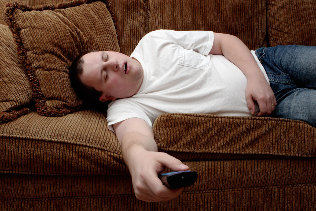
- Violation of the circulation of the blood. This causes the increase in size of the prostate. Cause of the problems is the sedentary lifestyle and excess weight;
- Infectious diseases. The infection often occurs due to urethritis or gonorrhea. In more rare cases causing factors act as the flu, tonsillitis, tuberculosis;
- Bacterial inflammation. Cause of the problems is the penetration of the infection in the prostate. This problem may occur through the blood, lymph or during sex. The cause of the problems can be the bacteria that live on the surface of the human body, or in the abdominal cavity;
- Traumatic defeat of the organs of the pelvis. Also often presented as the cause of the violation of the blood flow in that area. That is why prostatitis is often develops of the conductors, which are exposed to the vibration;
- The supercooling and the low physical activity. The factor that causes can act in chronic diseases of the genitourinary system, hormonal imbalance, lack of consistent sex. The cause may be the delay of urination;
- The physical inactivity. The insufficient level of physical activity negatively influences the function of endocrine organs, the heart and the blood vessels, the nervous system. This process is accompanied by a violation of the circulation of the blood in the pelvic organs. When the hypoxia of the tissues of the gland, the conditions are created for the active multiplication of pathogenic microorganisms. These factors provoke the development of prostatitis;
- Inflammatory defeat direct of the bowel or the urethra. It is a violation leads to a second infection of the prostate. Can be ascending or descending;
- The chronic constipation. Violations of the chair involve inflammatory changes in the authority.
The main causes of the disease are recurrent infection and a series of venereal diseases. In this category are included urethritis, gonorrhea. Causing factors can be even such violations, such as chronic bronchitis, dental caries, sore throat.
Types of prostatitis
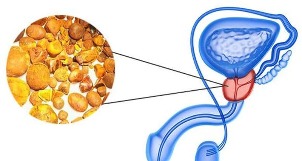
The symptoms of prostatitis are directly dependent on its variants. Doctors distinguish several varieties of the disease, to each of which is characterized by certain features.
Bacterial
This form of the disease is usually diagnosed in 21 to 43 year. In this case, the main symptoms of the inflammation of the prostate include a substantial increase in the temperature could rise up to 40 degrees. Also in the people it produces general weakness, chills, violation of urination.
Often, patients suffer a violation of erection, pain sensations in the groin, purulent and bloody impurities in the urine. The chronic form of the disease has a weaker manifestation. However, in case of relapse of the disease symptoms of prostatitis are intensified.
Calculous
The main manifestations of the disease are pain sensations in the pelvis, the sacrum and the crotch. The discomfort is increased when the motor activity of the body. The disease is characterized by the violation of urination, bloody impurities in the urine, increased irritability, weakening of erection.
Have stopped
For this form of the disease is characteristic of chronic disease filtration of water. The disease develops when a violation of the blood flow in the pelvic organs. It can also be the cause of a stagnation of the secretions of the prostate. Generally, it is observed the absence of sex.
For this form of the disease have problems with urination. Also the person experiences feelings of discomfort in the testicles and in the groin. He can increase the temperature, decrease the erection, develops depression.
Purulent
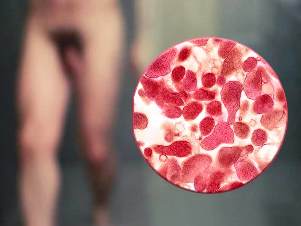
The term that comprise one of the biggest uses acute bacterial forms of the disease. For purulent prostatitis is a characteristic of a substantial increase of control of temperature up to 40 degrees. Also the man experiences the contrast of the impurities in the urine, it breaks down the urination, occur expressed by the pain in the crotch and the inguinal area.
The symptoms of the
The symptoms of inflammation of the prostate depend on the stage of the pathology is:
- Catarrhal. In this case, the man displayed the symptoms of fast urination. Also experience pain during the emptying of the bladder. The patient may experience discomfort in the crotch and the sacrum.
- Follicular. Pain syndrome is becoming more and more frequent, sometimes in the anal area and grows with the evacuation of the bowel. This stage of the disease is accompanied by a violation of urination. In man, the urine flows in a thin stream. Sometimes there is a delay of urine, a little bit of a fever.
- Parenchyma. For it are characteristic symptoms of a total of intoxication, a substantial increase of the temperature up to 38 to 40 degrees, the state of the inflammation. The man appear urinary problems and you experience acute pain in the crotch. Often disturbed defecation.
If time does not treat the pathology is, there is the chronic prostatitis. It is characterized by eradicated, the clinical picture. In rare cases, the thermal performance increases up to low-grade values.
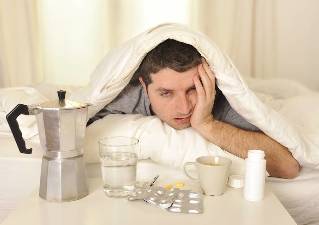
Quite often the pathology is a consequence of chronic inflammation, which is associated with the specific infection of the infection. This can be the gonorrhea, Ureaplasma, trichomonas. In this case, the person may attend small selection of the urethra, unexpressed pain in the area of the crotch, the increase of the discomfort when urinating.
Also the chronic form may be accompanied by a burning sensation in the crotch area and the urethra. In man it produces excessive fatigue, rapes, dysuria. In case of problems with impotence, the man is faced with psychic anxiety, increased anxiety, irritability.
Pain syndrome
The prostate contains receptors painful. The factor that causes the discomfort is the participation in the abnormal process of the nerve fibers. People with the chronic form of the disease is original the pain of different degree of weak to very intense.
Syndrome pain changes its intensity when the sexual abstinence, ejaculation, or the increase in sexual activity. The discomfort occurs in the sacral area of the crotch and scrotum. Sometimes it feels even in the lumbar area.
Dysuric syndrome
The inflammation causes the increase in size of the prostate, which leads to a pinching of the ureter. Your ride height will be less. The man produced a greater frequency of urination. You can also see the feeling of incomplete emptying of the authority.
Normally dysuric disorders manifest in the early stages of the disease. After this, it produces compensatory hypertrophy of the muscles of the bladder and the ureters. At this time the signs of dysuria it. The imbalance of these mechanisms become to increase.
The diagnosis
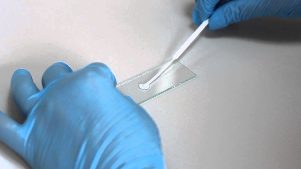
To identify the inflammation of the prostate, it is necessary to consult a urologist. By the clinical picture of the pathology is can be determine the disease and even its stage of development. The inflammation and the increase in size of the prostate gland that can be visualized with the help of the ultrasound.
The key of the diagnostic procedures are the following:
- Palpation of the prostate – the manipulation performed by the urologist;
- Various studies of the urine – in general, tests, bacteriological;
- The research microscpica of seminal fluid;
- A sample of the urethra – the analysis of the secretion is performed to evaluate the composition of the ediacarense;
- The content analysis of PSA – during the manipulation to evaluate specific protein of the prostate.
In most cases, these manipulations is sufficient. If you have difficulty with the diagnosis is performed urodynamic study. For this man hospitalitynet.
In more rare cases Cytoscape. This procedure applies not only to the diagnosis. It can also be a curative treatment. Manipulation provides an internal study of the bladder and of the urethra. If there is no damage there is no need to carry out the procedure.
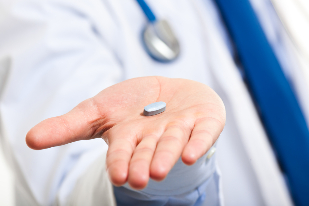
The treatment of the
Methods for the treatment of prostatitis selected taking into account the shape and the characteristics of the incidence of the disease. Acute prostatitis is accompanied by a strong intoxication, febrile state, the violation of well-being.
In this case, the patient requires urgent hospitalization. It shows the introduction of intravenous antibiotics. Other forms of prostatitis, the need for this type of treatment is not.
Medical therapy
When the shape of the pathology is recommended the use of antibiotics. If the cause of the disease is not the bacteria, the application of the resources will not give the desired results.
Antibiotics are used to treat almost all acute infections. The drugs used, the severe form of the disease chosen taking into account the data of the diagnostic studies. The doctor determines the particular type of this micro-organism, that caused the pathology is, and their degree of sensitivity to the drugs.
To deal with the constant pains in the pelvic and perineal, shows the use of a muscle relaxant and alpha-blockers. With the help of antispasmodic means, and alpha-blockers can relax the muscles of the affected organ and the bladder. This facilitates the excretion of urine and found to comply with the symptoms of the disease.
For the solution of protection from the stress of the muscle tissue, the elimination of oppression in the inflammation of the prostate and reduce the pain, the doctor may prescribe muscle-relaxing drugs.
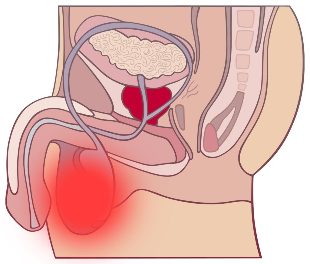
In difficult situations, and you can not do without the introduction of intravenous fluids and use of diuretics. Thanks to this type of treatment may stimulate the excretion of urine, which helps to avoid poisoning of the organism. This treatment prevents the appearance of further spread of the infection in the bladder.
To eliminate the signs of non-bacterial forms of the disease of the prescription of analgesic drugs drugs drugs anticholinergic of the tool. When the chronic constipation it is necessary to use emollient laxatives. It is effective for mineral oil.
Even when the solution of the main symptoms of the acute bacterial pathology is, it is important to undergo a course of therapy is complete. If you leave treatment prematurely, it is likely that the hronizatsii of the process. Subsequently, it is prescribed support methods of treatment.
In some cases, the development of the pathology is to follow a diet. Of the consists in the exclusion of acute and fatty foods. You should also give up caffeine. The world is found here, and acidic beverages.
In the state of men influences favorably systematically the premature ejaculation. It allows for the drainage of the prostate secret. In acute violation of urination put temporary suprapubic fistula. Can also be carried out periodically for the catheterization.
The surgical intervention
The operation will be determined by the absence of the effect of the use of medications. Also an indication for the surgical treatment of the prostate is blocking the flow of urine prostate. Keep in mind that the youth of the patients, this method is not prescribed, as it may cause infertility.
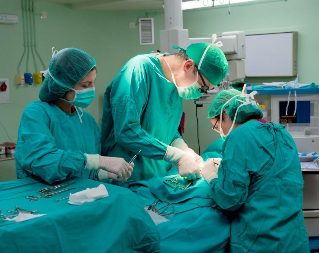
There are several types of surgery:
- Transurethral resection of the authority – that includes the removal of all the tissues;
- Prostatectomy – the procedure consists in the removal of the prostate and the adjacent tissues. In the course of the handling of the cut and the seed of the bubbles. This is a fairly complex intervention that often leads to impotence and may be the cause of the incontinence of urine.
The consequences of the
If the time not to proceed with the therapy, there is a risk of hazardous effects to the health. First of all, the prostatitis is dangerous to the development of an abscess. If in the formation of suppurativa of the defeat of the prostate increases significantly the temperature. The heat changes the symptoms of inflammation.
A sharp pain in the crotch leading to the disturbance of urination and defecation. The increase of the swelling of the prostate leads to serious problems with urination.
In more rare occasions, it occurs independent of the autopsy of an abscess, after which your content is found in the intestine or the urethra.
The spread of infectious agents in the chronic form of the disease, causes the appearance of cystitis and pyelonephritis. Often the consequences of the pathology is carried inflammatory the defeat testicular. There is also the risk of the emergence vezikulita, which is a swelling of the seed bubbles. As a result of these processes is often observed failure of the reproductive function.

The prevention of the
To prevent the onset of inflammation or relapse of a disease is chronic, you should follow these recommendations:
- Reduce your intake of alcohol;
- Systematic of sport activities;
- Prevent hypothermia;
- To stop smoking;
- Avoid stressful situations;
- Time of treating the inflammation – this happens especially in sexual infections;
- Take contrast showers;
- Avoid lifting heavy objects;
- Use barrier methods of contraception;
- Systematic of having sex;
- Taking vitamin medications;
- To fortify the immunity;
- Two times a year to visit a urologist;
- Correctly and balanced way to eat.






























